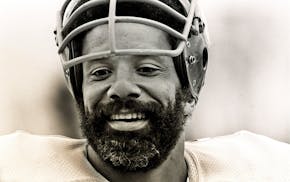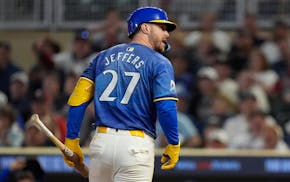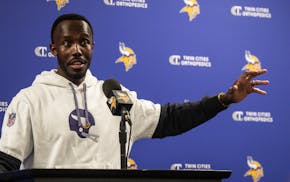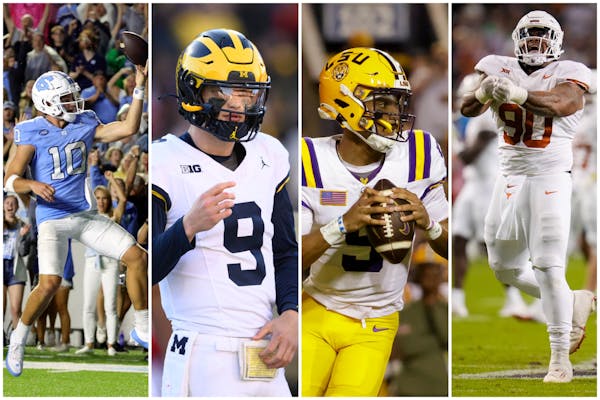Whenever he's asked for his thesis on the most important position in football, Kevin O'Connell returns almost invariably to the topic of a quarterback's journey. He speaks about it with a fascination that only seems to have grown the longer he's staked his career on it.
O'Connell turns 39 on May 25, the weekend after he will have ostensibly coached a rookie quarterback through the Vikings' first week of organized team activities. He is 17 months younger than Aaron Rodgers, the NFL's oldest current starting quarterback. Had O'Connell's career taken a different path after the Patriots made him a third-round pick in 2008, he could be one of the NFL's oldest players, rather than one of its youngest head coaches. There is no bitterness in his voice as he reflects on the pivot, only wonder at the mystical process that remains so difficult to nail and could soon shape the Vikings' future.
As he sat at a table overlooking the sprawling lawn at the Ritz-Carlton Grande Lakes in Orlando during the NFL owners' meetings on March 25, O'Connell said, "I always use a loose, light term with my own [career], calling it a 'quarterback journey,' but it was one nonetheless."
The conversation shifted to Sam Darnold, the third overall pick in 2018 who signed a one-year deal to make the Vikings his fourth franchise in seven years. O'Connell said Darnold, still just 26, could flourish given the right environment. The Vikings, with former quarterbacks layering the coaching staff and Pro Bowlers doing the blocking and receiving, could provide that environment.
"Quarterbacks can be at different phases, parts of their career that maybe don't always align with performing for three and a half hours on Sunday," he said. "If you go through the process and get around some good coaches, which I think Sam was in San Francisco, [you can grow]. … As a young quarterback, or really any sort of quarterback coming into our situation, I do feel strongly about the opportunity we can offer."
The true test of O'Connell's theory, of course, is not likely to be Darnold. It could arrive as soon as Thursday night, if the Vikings draft the quarterback for whom they've been planning practically since O'Connell and General Manager Kwesi Adofo-Mensah arrived in Minnesota in 2022. They have scouted the 2024 draft class for two years, making only temporary commitments to Kirk Cousins in the meantime and stopping short of the move up for a quarterback they contemplated in the 2023 draft in part because they knew the promise this class held. They let Cousins leave in free agency, acquired the No. 23 pick from Houston to go with their 11th overall choice and put at least a half-dozen quarterbacks through a pre-draft process O'Connell designed.
Thursday could be the consummation of that process, especially if the Vikings trade up even one spot from No. 11 to take the highest-drafted quarterback in franchise history. But it could also be a commencement of sorts, with O'Connell at the top of an infrastructure that seems as precisely engineered for quarterback development as the Vikings could hope.
The Vikings have drafted a quarterback in the first round just four times in franchise history. The last time they paired a first-round QB with an offensive head coach was 1999, when Dennis Green took Daunte Culpepper 11th overall.
Christian Ponder, selected 12th in 2011, flailed under a coaching staff (led by Leslie Frazier) that never seemed to be in lockstep with the front office. Teddy Bridgewater, the 32nd overall pick in 2014, was turning into an effective game manager for a defensive-minded head coach (Mike Zimmer) before a 2016 knee injury rattled his career trajectory.
O'Connell was hired to replace Zimmer and embraced Cousins, winning a division title with him in 2022 and forming a close partnership with the quarterback. But it seemed only a matter of time until the Vikings would entrust the position's future to the head coach they'd hired to safeguard it.
O'Connell backed up Tom Brady, studied under Bill Belichick and speaks about his own short-lived career with enough wry humor that suggests he's used it as a reference for young QBs hoping to avoid similar pitfalls. This winter, he hired Josh McCown, a 17-year NFL veteran who played for nine teams and for O'Connell in the latter's first NFL QB coach job in Cleveland, to inject quantities of detail and institutional knowledge into a rookie's instruction that could only come from a player with his experience.
Offensive coordinator Wes Phillips comes from a three-generation NFL family and won a Super Bowl with the Rams and O'Connell under Sean McVay. So did former quarterbacks coach Chris O'Hara, who is still on staff as a senior offensive assistant and pass game specialist. Assistant QB coach Grant Udinski, viewed as a rising star on the Vikings' staff, figures to provide the kinds of extra hours-long teaching sessions that have made him a trusted resource for the team's quarterbacks.
A rookie would join a quarterback room with two veterans, including one (Darnold) who knows about beginning a career atop the NFL QB high wire. He would throw to Justin Jefferson, Jordan Addison and (eventually) T.J. Hockenson, hand off to Aaron Jones and be protected by Christian Darrisaw and Brian O'Neill. The Vikings, it seems, have put in as many trail guides and signposts as possible to help a young quarterback along the journey O'Connell speaks so much about.
The question is, will it work?
Since the start of the Super Bowl era in 1966, there have been 102 quarterbacks selected in the first 10 picks of the draft. While more than half of those players (52) have reached a Pro Bowl, just 13 have earned first-team All-Pro honors in their careers, and only eight are in the Hall of Fame (though quarterbacks like Patrick Mahomes figure to raise that total).
The numbers underscore what O'Connell has witnessed and lived: there are enough pitfalls along the way that the QB journey is rarely flawless.
"Every quarterback goes to different environments, different systems, different organizations, and that path is not the same for every player," O'Connell said last week. "The timeline of when they're reaching their early peak of their rookie contract, when it's so valuable to have a rookie because of all the financial terms, that's one thing. But you also want to make sure that you're developing and doing what's best for the player. We just happen to have a really good situation, in my opinion, with the players we have in that huddle, the guys that are going to be coaching that player. Then ultimately, what we hope [we have] is a long-term plan to have a really special player at the position.
"But all that can't happen without a daily process where you're attacking and understanding what you need to get better at, how the NFL game may be different than the college level and what that system was like versus what we'll do. I think there's a lot of ways you can look at different strengths of different players in the draft and say, 'You can make a pretty good projection that high-quality quarterback play could be in their future.' But there's a lot of work and time and effort to help them get there."
The Vikings have completed some of that work: scouting prospects, building a QB-friendly coaching staff and outfitting the roster with offensive weapons. The most important work, though, could be days — maybe even hours — from starting.
The next quarterback journey O'Connell oversees could, one way or the other, change the course of the franchise.
A $2.8 billion settlement will change college sports forever. Here's how

Reusse: Country boy Jim Marshall never lost his lust for life

Twins open homestand with loss to Blue Jays, Jeffers ejected after critical call

Vikings GM talks to the Star Tribune about the team's 2025 outlook, McCarthy's trajectory

